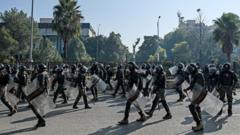Supporters of Imran Khan, the former Prime Minister of Pakistan, have called off protests after facing a severe crackdown from security forces in Islamabad. Despite initial triumph in reaching central areas, the protests were met with strong police resistance, leading to fatalities and mass arrests.
Imran Khan's Supporters Halt Protests Amidst Government Crackdown

Imran Khan's Supporters Halt Protests Amidst Government Crackdown
Tensions rise in Islamabad as protesters demand the release of former Prime Minister Imran Khan, leading to clashes with security forces.
In a dramatic turn of events in Pakistan, supporters of the imprisoned former Prime Minister Imran Khan have decided to temporarily halt their protests, demanding his release after clashing with government forces on the streets of Islamabad. Protesters, rallying for Khan's freedom, initially vowed to remain in the capital until their requests were met. However, their fervor encountered a harsh response from security personnel who employed tear gas to disperse the crowds, leading to intense confrontations.
The protests, which began over the weekend, escalated as supporters breached police barricades in an attempt to reach Democracy Square. By Tuesday afternoon, a combination of heightened police presence and tactical dispersal measures had cleared the area, resulting in the tragic deaths of two civilians and four security officers during the violence. In a statement issued by Khan's party, Pakistan Tehreek-e-Insaf (PTI), they characterized the government’s actions as “brutal” and announced the decision to suspend demonstrations.
Following the violence, reports indicated significant arrests of PTI members, with government sources claiming over 500 were detained. Tensions remain high with the information minister asserting that police did not fire on protesters, despite claims from the PTI regarding possibly fatal confrontations. Protesters had responded to Khan’s impassioned calls for resilience, aiming to rally at D-Chowk—a historical site for rallies since the 1980s.
Despite being imprisoned for over a year on charges he deems politically motivated, Khan continues to wield considerable influence over Pakistan's political landscape. His party, facing restrictions, managed to emerge as the largest group in the recent February elections, albeit without a sufficient majority to form a government. The PTI has cried foul regarding the election results, alleging rigging while the ruling administration denies these claims. The future of protests and political tensions remains uncertain as Khan's followers grapple with the aftermath of the crackdown.





















